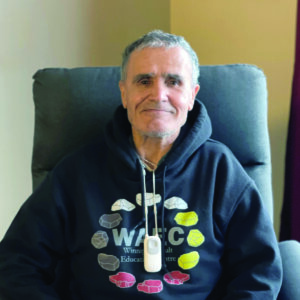Dementia-Friendly Communities
We can all help people living with dementia feel safe and included by supporting them in the community — whether at the post office, their favourite shop, using transportation or enjoying hobbies and recreation.
What is a dementia-friendly community?
Dementia-friendly communities focus on stigma reduction and the inclusion of people living with dementia through social and physical environments. This can reduce anxiety and frustration, as people are educated about the disease and understand that a person living with dementia experiences the world differently.
The term “community” can mean a location like a neighborhood or city, but can also include groups of people with shared interests or features, such as professional groups, religious organizations or businesses. This means that cities and towns can become dementia-friendly communities, but so can your book club, your business, a local coffee shop, a faith group or grocery store.
Social characteristics

In a dementia-friendly environment, community members recognize that:
- Everyone has a role in supporting, valuing and including people living with dementia
- A person living with dementia is more than their diagnosis
- Dementia can affect someone’s thinking, behaviour, emotions and physical capabilities
Physical characteristics

A welcoming physical environment includes:
- Open areas for activity and rest
- Clear signage at eye level
- Flat, wide and unobstructed sidewalks and walkways
- Clearly marked accessible washrooms in public spaces
- Distinctive structures that can act as landmarks
What can your community do?
There are many ways your community can become more dementia-friendly – and we can help! You can:
- Request dementia education from the Alzheimer Society to help community members understand dementia and learn how to offer appropriate assistance.
- Include people living with dementia in community or organizational programming.
- Encourage staff in your city, town or municipality – whether at libraries or community centers, or parking and by-law officers, police and firefighters – to be educated about dementia and be able to communicate effectively with people living with dementia.
- Work with others in the community, such as shopkeepers, bank tellers and bus drivers, to receive dementia education specific to their job.
Help your organization become more dementia-friendly.
To request a dementia-friendly communities presentation for your organization, please contact Nicole McDonald at 204-943-6622 or nmcdonald@alzheimer.mb.ca.
Testimonial

Building Dementia-Friendly Communities online course

Dementia-Friendly Canada created a self-paced Building Dementia-Friendly Communities online course to help professionals working in the recreation, library, retail, restaurant and public transportation sectors who are interested in fostering dementia-friendly awareness within their organizations.
This self-paced 75-minute course will give organizations the knowledge and skills needed to increase support, inclusion and accessibility (both in the social and physical environments) for people living with dementia.
Dementia-friendly communities resources
Touch quilts bring comfort, happiness and can lessen feelings of sadness and fear for someone affected by dementia.
Caring volunteers craft touch quilts in hopes of providing one to every person residing in a personal care home in Manitoba, as well as creating a sense of community giving. This initiative helps create awareness and education opportunities about the importance of brain health, dementia and how the Alzheimer Society of Manitoba can help those affected by dementia.
To learn more, receive a touch quilt or to svolunteer, please contact Alana Evans, Education Coordinator, at aevans@alzheimer.mb.ca.